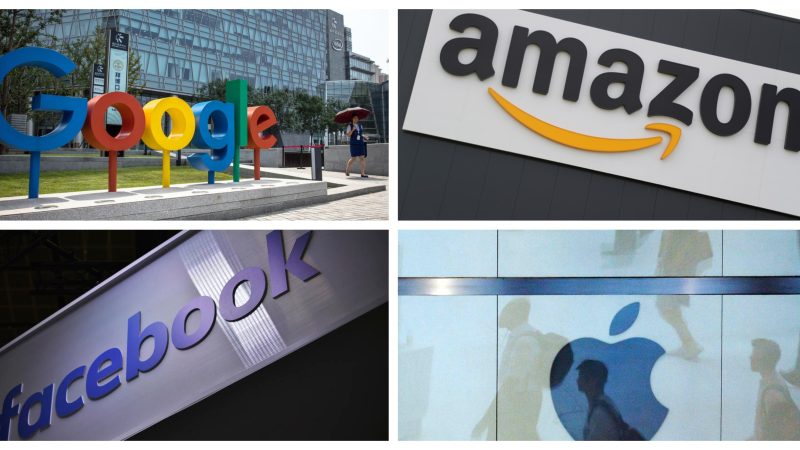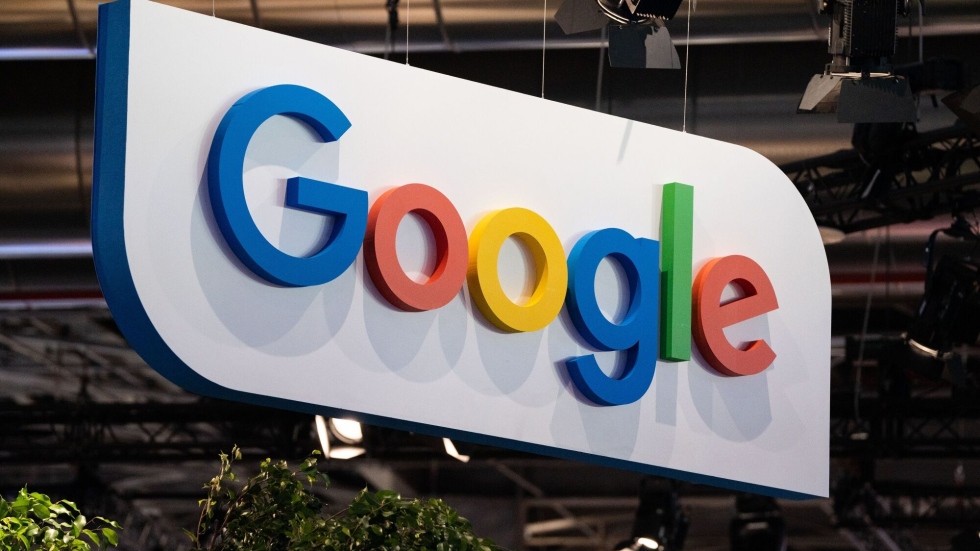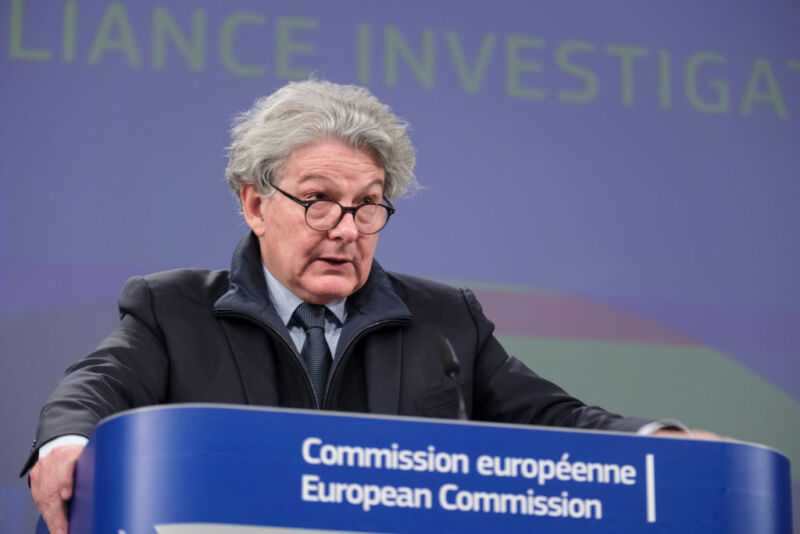Business
Apple, Google And Meta At Risk Of ‘Heavy’ Fines As Europe Launches New Probes

The European Union has begun investigations into Apple, Google, and Facebook parent Meta, alleging they fail to comply with a new historic European rule to encourage competition in digital services.
The European Commission stated that it “suspects” that all three corporations’ actions “fall short of effective compliance” with the Digital Markets Act (DMA), which took effect earlier this month. If the investigations reveal a “lack of full compliance,” they may face “heavy fines,” according to European Commissioner Thierry Breton.
Apple, Google And Meta At Risk Of ‘Heavy’ Fines As Europe Launches New Probes
The DMA mandates dominant online platforms to provide users with more options and competitors with more opportunities to compete. It currently applies to the three internet titans under investigation, as well as Amazon (AMZN), Microsoft (MSFT), and TikTok’s Chinese parent company, ByteDance.
The EU has stated that the list might include Elon Musk’s X and Booking.com by mid-May.
Violations of the new rule may result in severe penalties, including fines of up to 10% of a company’s global revenue and up to 20% for further violations. This would amount to tens of billions of dollars for most regulated enterprises.
The European Commission is looking into Meta’s “pay or consent” policy, among other activities. Last October, Meta (META) announced a subscription service named “Subscription for no ads,” which allows European users of Facebook and Instagram to pay up to €12.99 ($14) per month for ad-free versions.
“The Commission is concerned that the binary choice imposed by Meta’s ‘pay or consent’ model may not provide a real alternative in case users do not consent, thereby not achieving the objective of preventing the accumulation of personal data by (large companies),” the agency said in a statement.
A Meta representative responded: “Subscriptions as an alternative to advertising are a well-established business model across many industries, and we created ‘Subscription for no advertisements’ to fulfill multiple overlapping legal duties, including the DMA. We will continue to work constructively with the Commission.
The EU is also looking into app marketplaces run by Apple (AAPL) and Google. According to the DMA, significant digital platforms, often called gatekeepers, must allow app developers to “steer” consumers to deals outside the two leading shops for free.
Apple, Google And Meta At Risk Of ‘Heavy’ Fines As Europe Launches New Probes
Among other issues, the EU fears that Apple and Google’s parent Alphabet (GOOGL) limit developers’ capacity “to freely communicate (with end-users), promote offers, and directly conclude contracts, including by imposing various charges,” the Commission stated.
“We are concerned that Alphabet, Apple, and Meta are not meeting their obligations; for example, Apple and Alphabet continue to charge recurring fees to app developers,” European Commissioner Margrethe Vestager wrote on X Monday.
The European Commission has also raised concerns about Apple’s “choice screen” for Safari. According to the DMA, Apple must alert consumers with “choice screens that must effectively and easily allow them to select an alternative default service, such as a browser or search engine on their iPhones.”
In a statement to CNN, Apple said: “We’re confident our plan complies with the DMA, and we’ll continue to constructively engage with the European Commission as they conduct their investigations.”
Another of the Commission’s worries is about Google Search. Alphabet may not have done enough to guarantee that third-party services appearing in search results are treated in “a fair and non-discriminatory manner” compared to Alphabet’s services, such as Google Shopping and Google Flights.
Apple, Google And Meta At Risk Of ‘Heavy’ Fines As Europe Launches New Probes
Google’s competition chief, Oliver Bethell, said in a statement: “To comply with the Digital Markets Act, we have made major modifications to how our services function in Europe.
“Over the last year, we have held dozens of events with the European Commission, stakeholders, and third parties to solicit and respond to input, as well as to balance competing needs within the ecosystem. We will continue to defend our stance in the coming months.”
SOURCE – (CNN)
Business
Sonic the Hedgehog Dominates Christmas Wish Lists

Sonic the Hedgehog is dominating Christmas wish lists this year. The lovable blue hedgehog is back in the spotlight, from sonic the hedgehog toys and games to sonic the hedgehog coloring pages and movie hype.
Sonic-themed holiday merchandise is on fire, from quirky sweaters to action figures flying off shelves. Sonic the Hedgehog Christmas outfits for kids are selling out fast, making them a go-to gift option for festive fun.
Retailers have been quick to recognize Sonic’s holiday appeal. Special promotions and exclusive items, like the Sonic holiday t-shirts, are everywhere.
Everyone’s stocking up on Sonic merchandise, from big-box stores to boutique retailers.
Online shopping platforms are seeing a surge in searches for Sonic items. Whether it’s Sonic Christmas-themed tops or Sonic the Hedgehog coloring pages, Sonic the Hedgehog toys or Sonic and the Hedgehog 3, the demand is skyrocketing.
Retailers who tap into this trend are sure to see strong holiday sales.
Sonic has been around since the early 90s, but his popularity never wanes. With the release of Sonic 3, fans are more excited than ever.
Sonic the Hedgehog 4
Meanwhile, Paramount Pictures is preparing “Sonic the Hedgehog 4,” with the newest addition in the family-friendly genre set for a spring 2027 release.
The announcement comes as “Sonic 3” opens in theatres on Friday, estimated to gross $55 million to $60 million from 3,800 North American locations.
The sequel is shaping up to be a good holiday season blockbuster for Paramount, which explains the desire in future “Sonic” adventures. On the international front, the film will be released on Christmas Day in 52 markets.
On Rotten Tomatoes, critics gave “Sonic 3” an outstanding 87% fresh score.
The first two films grossed a total of $725.2 million at the global box office and generated over $180 million in global consumer expenditure through home entertainment rentals and digital purchases.
They also inspired a spinoff Paramount+ series, “Knuckles,” which premiered earlier this year.
Related News:
Man Creates Candy Cane Car to Spread Christmas Cheer
Business
Amazon Strike Called By Teamsters Union 10,000 Walkout

An Amazon strike has hit facilities in the United States in an effort by the Teamsters union to pressure the corporation for a labour agreement during a peak shopping season.
The Teamsters union told the Associated Press that Amazon delivery drivers at seven facilities in the United States walked off the job on Thursday after the firm failed to discuss a labour contract.
According to the union, Amazon employees in Teamsters union jackets were protesting at “hundreds” of additional Amazon facilities, which the union billed as the “largest strike” in US history involving the company.
The corporation, which employs over 800,000 people in its US delivery network, stated that its services will be unaffected.
It was unclear how many people, including members of Germany’s United Services Union, participated in Thursday’s demonstration. The Teamsters union reported that thousands of Amazon employees were implicated in the United States.
Amazon Strike at 10 Locations
Overall, the group claims to represent “nearly 10,000” Amazon strikers, having signed up thousands of people at roughly ten locations across the country, many of whom have joined in recent months.
The organization has claimed recognition from Amazon going on strike, claiming the firm illegally neglected its obligation to bargain collectively over salary and working conditions.
The Teamsters is a long-standing US union with nearly one million members. It is well-known for securing lucrative contracts for its members at companies like delivery behemoth UPS.
Most of the Teamsters’ Amazon campaigns have concerned drivers working for third-party delivery companies that partner with the tech behemoth.
Amazon denies that it is liable as an employer in those circumstances, which is a point of legal contention. In at least one case, labour officials have taken a preliminary stance in favour of the union.
Stalled Contract Negotiations
Amazon employees at a major warehouse on Staten Island in New York have also chosen to join the Teamsters. Their warehouse is the only Amazon facility in the United States where labour officials have formally recognized a union win.
However, the Amazon strike is because contract negotiations have not progressed since the 2022 vote. It was not one of the areas scheduled to go on strike on Thursday.
Amazon, one of the largest employers in the United States, has long received criticism for its working conditions and has been the target of activists seeking to gain traction among its employees.
Related News:
Amazon Releases Nova, a Fresh Set of Multimodal AI Models.
Business
Amazon Encounters Numerous Strikes As Unions Aim At The Holiday Shopping Surge.

(VOR News) – Thousands of Amazon employees at various sites across the country were scheduled to go on strike on Thursday in an effort by the Teamsters union to pressure the retail behemoth to acknowledge its unionised workers in the United States.
The walkout is expected to concentrate on seven Amazon locations across the country during the holiday purchasing surge and may be the most significant union action against Amazon in the nation’s history.
The business announced on Thursday morning that there had been no effect on operations. It also stated that it is “continuing to concentrate on fulfilling customers’ holiday orders.”
The International Brotherhood of Teamsters maintains that it represents more than 10,000 Amazon employees and contractors in aviation centres, warehouses, and delivery centres.
Amazon has refused to acknowledge the union for many years.
The retail giant, which employs approximately 1.5 million individuals, excludes contractors and part-timers. A strike has been initiated by delivery couriers and warehouse employees at seven distinct locations in order to exert pressure on the company to negotiate a collective bargaining agreement that would encompass modifications to compensation, amenities, and working conditions.
Picketing was intended for New York, Atlanta, Los Angeles, San Francisco, and Skokie, Illinois.
Also, the Teamsters assert that they are establishing picket lines at “hundreds” of additional warehouses and delivery centres by encouraging non-unionized workers to picket under U.S. labour law, which protects workers’ ability to take collective action to further their interests.
“Amazon workers are exercising their power,” Randy Korgan stated to NPR.
“They now realise there is a pathway to take on a corporate giant like this – and that they hold the power.” Amazon responds by accusing the Teamsters of fabricating information regarding the strikes, asserting that the participants are “entirely” outsiders rather than employees or subcontractors of the corporation.
Amazon spokesperson Kelly Nantel stated that “the reality is that they were unable to secure sufficient support from our employees and partners and have invited external parties to harass and intimidate our team.” For more than a year, the Teamsters have been intentionally misleading the public by claiming to represent “thousands of employees and drivers.” They do not.
The Teamsters did not provide a specific duration for the strike; however, they informed NPR that it would extend beyond one day. Workers would receive $1,000 per week in strike money, as per the union.
Teamsters President Sean O’Brien issued a statement in which he stated, “If your package is delayed during the holidays, you can attribute it to Amazon’s insatiable greed.” We established a firm deadline for Amazon to attend the meeting and treat our members equitably. They disregarded it.
The Teamsters granted until December 15 to convene with its unionised employees and develop a collective bargaining agreement.
Amazon has opposed all unionisation efforts in court, asserting that unions were not advantageous to its employees and emphasising the compensation and benefits that the organisation currently provides.
Amazon has been accused of discriminatory labour practices on numerous occasions, including the termination of labour organisers. Furthermore, it has disputed its official status as a contract employer.
Teamsters organize Amazon delivery couriers and other employees.
In June, Amazon established its first unionised warehouse in Staten Island, New York, two years after making history by voting to join the fledgling Amazon Labour Union, which is also affiliated with the Teamsters.
The union is one of the most influential in the United States and Canada, with 1.3 million members. On Thursday, the German United Services Union declared that Amazon employees in Germany would participate in a strike in conjunction with their American counterparts.
In the past, Amazon has experienced demonstrations in Germany and Spain that were related to the holiday season in order to advocate for improved wages and working conditions.
“The holiday season has arrived.” Delivery is anticipated. Patricia Campos-Medina, the executive director of Cornell University’s Worker Institute, asserts that “this is the moment in which workers have control over the supply chain.”
The Teamsters have reported that Amazon’s profits have increased both during and after the pandemic. The corporation is currently valued at over $2.3 trillion, with net income of $15 billion in the most recent quarter alone. It is the second-largest private employer in the United States, following Walmart.
SOURCE: NPR
SEE ALSO:
SoftBank Is Courting Trump With a Proposal To Invest $100 Billion in AI.
TVA News Montreal Becomes Most-Watched News Source in Quebec
-
Politics4 weeks ago
Miller Expects 4.9 Million Foreigners to Leave Canada Voluntarily
-
News3 weeks ago
Nolinor Boeing 737 Crash Lands in Montreal
-
News2 weeks ago
“Shocking Video” Vancouver Police Shoot Armed Suspect 10 Times
-
Tech4 weeks ago
Increasing its Stake in OpenAI by $1.5 Billion is a Possibility for SoftBank.
-
News4 weeks ago
Facebook Securities Fraud Case Dropped
-
Health4 weeks ago
A Canadian Teenager’s Bird Flu Virus Has Mutations































